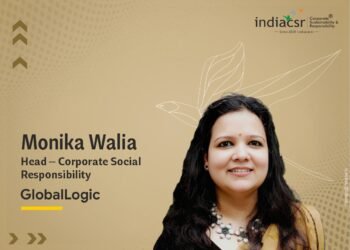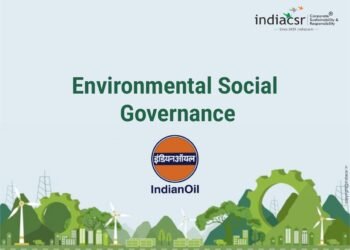In an exclusive interaction with Rusen Kumar of India CSR; Satyakam Arya, CEO & MD, Daimler India Commercial Vehicles talked on sustainability initiatives undertaken and the accomplishments so far. As sustainability forms one basic principle of DICV’s corporate activities, the company is dedicated to fostering a more sustainable future, envisioning a world free of harmful emissions. DICV’s main goal is to take advantage of the opportunities offered by sustainability and reduce the carbon footprint with Reduce, Recycle and Reuse. With this approach, DICV serves its customers and stakeholders through a more environmentally conscious standpoint and improves the communities where they do business. Excerpts of an interview:
What is DICV’s approach towards integrating sustainability while making business decisions?
Our company is dedicated to fostering a more sustainable future, envisioning a world free of harmful emissions.
Our approach is to take advantage of the opportunities offered by sustainability and reduce our carbon footprint with Reduce, Recycle and Reuse. We take a practical, long-term view towards our sustainability initiatives, understanding that financial investments in the short-term have the potential to pay big dividends both environmentally and financially in the long-term.
As we are pave the way to more sustainable operations, the entire planning and strategizing of sustainability have now evolved as a guiding star for our organization during decision-making.

Solar Panel Energy-generation plant with over 10,000 polycrystalline solar power panels. Location: Chennai
Tell us about your efforts in the areas of renewable energy and water consumption in your plant?
DICV has made huge leaps in maintaining the groundwater level through the initiative “Water Neutrality Project”. The main purpose of this project was to utilize rainwater by Rainwater Filtration System (RWFS) for minimizing the utilization of groundwater, further maintaining the groundwater level that eventually supports the villages near the plant. Additionally, DICV’s project on “Water Management System” achieved 311 tons of CO2 reduction & raw water reduction of 5200 KL/year.
We have also embraced the concept of re-using hazardous waste by using it as an alternative fuel in external cement factories, which reduced 450 tons of CO2. We have successfully managed to increase the renewable energy share (Wind, Solar & Cogen) by 90% of green power.
Even our production shop at DICV is committed to “Green Production Target” to reduce 1% of the absolute energy consumption each year. With the target to escalate energy efficiency to 100%, our team at Manufacturing Engineering Daimler Trucks conducted an energy consumption study within powertrain production plants to identify all installed equipment with high-energy consumption. At our Chennai plant, one potential area of energy saving was identified in the engine test bed cooling system. The result was an energy consumption reduction of 360.000 kWh (33%) per year.
What are your accomplishments in these areas?
With the vision of “Reduce, Recycle and Reuse”, DICV’s sustainable efforts have been successful in achieving three key green production targets in the span of just four years. Our recycling ratio has improved to 99% with the use of 80% renewable energy in our manufacturing facility and we have reduced our water consumption by 20%. In addition, we have achieved several months of 100% renewable energy at our Oragadam plant.
DICV’s robust set of innovative and impactful sustainable initiatives address every aspect of our operational interaction with resources. Some of the key areas of our focus include maintaining the ground water level, re-using hazardous waste as an alternative fuel, reducing absolute energy consumption and focus on how our products use environmentally friendly materials.

Storage ponds that holds over 60,000 kiloliters of water in Chennai.
Carbon Neutralization, Digitalization on VOC (Volatiles Organic Compound) for stack and Ambient Air Quality Monitoring system, Digitalization on the online continuous effluent monitoring system, Optimization of shuttle bus routes & timings, and Scrap to gold projects are a few of our other initiatives in harnessing sustainability and productivity for a circular economy. Our team has also worked on small projects like using LEDs for lighting system, IoT based smart sensors, and cooling tower installation.
Can you tell us about any DICV initiative that you believe can help bring a change in the automotive sector’s approach to sustainability?
At DICV, we believe it is important to ‘Lead with the Long View’. Although the future may seem uncertain and very far away, it’s vital that all automotive companies understand the cumulative impact that our industry, and manufacturing as a whole, can have on the environment.
While DICV has undertaken some major sustainability measures such as our massive solar panel energy-generation plant (over 10,000 polycrystalline solar power panels) and the huge storage pond (holds over 60,000 kiloliters), we also look for smaller, simpler methods on an everyday basis. Basic changes such using LEDs for our lighting system and optimizing the timing and routes of our shuttle buses helps to make sustainability an everyday part of DICV.
Rather than focusing on any one single approach, it’s useful for companies to take a 360-degree look at how they can build sustainability into their products, processes and into their people’s mindsets. By making every employee aware of the importance of sustainability, ideas on how to improve a company’s carbon footprint can be sourced from all over the organization on an ongoing basis. Only in this way can ‘Sustainability’ become sustainable.
CopyRight@IndiaCSR/RusenKumar






















